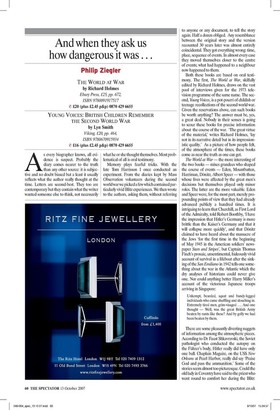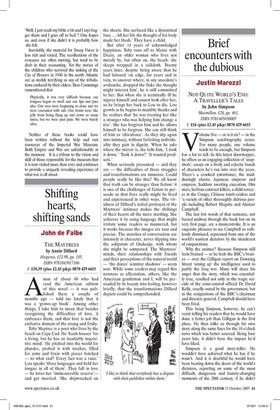And when they ask us how dangerous it was . . .
Philip Ziegler THE WORLD AT WAR by Richard Holmes Ebruy Press, £25, pp. 672, ISBN 9780091917517 £20 (plus £2.45 p&p) 0870 429 6655 YOUNG VOICES: BRITISH CHILDREN REMEMBER THE SECOND WORLD WAR by Lyn Smith Viking, £20, pp. 464, ISBN 9780670915934 £16 (plus £2.45 p&p) 0870 429 6655 As every biographer knows, all evidence is suspect. Probably the diary comes nearer to the truth than any other source: it is subjective and no doubt biased but a least it usually reflects what the author really thought at the time. Letters are second-best. They too are contemporary but they contain what the writer wanted someone else to think, not necessarily what he or she thought themselves. Most problematical of all is oral testimony.
Memory plays fearful tricks. With the late Tom Harrisson I once conducted an experiment. From the diaries kept by Mass Observation volunteers during the second world war we picked a few which contained particularly vivid Blitz experiences. We then wrote to the authors, asking them, without referring to anyone or any document, to tell the story again. Half a dozen obliged. Any resemblance between the original story and the version recounted 30 years later was almost entirely coincidental. They got everything wrong: time, place, sequence of events. In almost every case they moved themselves closer to the centre of events; what had happened to a neighbour now happened to them.
Both these books are based on oral testimony. The first, The World at War, skilfully edited by Richard Holmes, draws on the vast pool of interviews given for the 1973 television programme of the same name. The second, Young Voices, is a pot-pourri of childish or teenage recollections of the second world war. Given the reservations above, can such books be worth anything? The answer must be, yes, a great deal. Nobody in their senses is going to scour these books for precise information about the course of the war. 'The great virtue of the material,' writes Richard Holmes, lay not in its narrative detail but in its impressionistic quality.' As a picture of how people felt, of the atmosphere of the times, these books come as near the truth as one can get.
The World at War — the more interesting of the two books — mixes grandees who shaped the course of events — Eden, Mountbatten, Harriman, Donitz, Albert Speer — with those whose lives were affected by the great men's decisions but themselves played only minor roles. The latter are the more valuable. Eden and Speer were, for the most part, merely propounding points of view that they had already advanced publicly a hundred times. It is intriguing to learn that Churchill, as First Lord of the Admiralty, told Robert Boothby, 'I have the impression that Hitler's Germany is more brittle than the Kaiser's Germany and that it will collapse more quickly', and that Donitz claimed to have heard about the massacre of the Jews 'for the first time in the beginning of May 1945 in the American soldiers' newspaper Stars and Stripes', but Captain Thomas Finch's prosaic, unsentimental, hideously vivid account of survival in a lifeboat after the sinking of the San Emiliano in 1942 tells one something about the war in the Atlantic which the dry analyses of historians could never give one. Nor could anything better Harry Miller's account of the victorious Japanese troops arriving in Singapore: Unkempt, bearded, squat and bandy-legged individuals who came shuffling and slouching in. Extremely tired men, grim-visaged .... And one thought — Well, was the great British Army beaten by runts like these? And by golly we had been beaten by them.
There are some pleasantly diverting nuggets of information among the atmospheric pieces. According to Dr Faust Shkavravski, the Soviet pathologist who conducted the autopsy on the Fiihrer's body, Hitler really did have only one ball. Chaplain Maguire, on the USS New Orleans at Pearl Harbor, really did say 'Praise God and pass the ammunition.' Some of the stories seem almost too picturesque. Could the old lady in Coventry have said to the priest who went round to comfort her during the Blitz: 'Well, I just reads my bible a bit and I says bugger them and I goes off to bed.'? One hopes so, and even if she didn't it is probably how she felt.
Inevitably, the material for Young Voices is less rich and varied. The recollections of the evacuees are often moving, but tend to be drab in their recounting. Yet the stories of the children who survived the sinking of the City of Benares in 1940 in the north Atlantic are as starkly ten-ifying as any of the tribulations endured by their elders. Bess Cummings remembered that Physically, it was very difficult because our tongues began to swell and our lips and jaws also. Our eyes were beginning to close and we were encrusted with salt. Our fronts were like jelly from being flung up and down so many times, but we were past pain. We were barely alive.
Neither of these books could have been written without the help and vast resources of the Imperial War Museum. Both Empire and War are unfashionable at the moment. It is a tribute to the vision and skill of those responsible for the museum that it is now visited more than ever and continues to provide a uniquely revealing experience of what war is all about.




































































 Previous page
Previous page